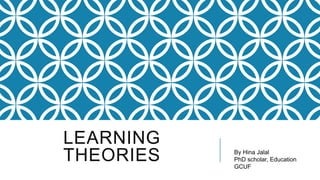
Classification of Learning theories
- 1. LEARNING THEORIES By Hina Jalal PhD scholar, Education GCUF
- 2. LEARNING THEORIES Learning as a process focuses on what happens when the learning takes place. Explanations of what happens constitute learning theories. A learning theory is an attempt to describe how people and animals learn, thereby helping us understands the inherently complex process of learning. Learning theories have two chief values according to Hill (2002). There are three major learning theories Behaviourism - It focuses on objectively observable behaviors and discounts mental activities. - Behaviorists define learning as the acquisition of new behavior. Cognitivism - How we acquire, store and process information - It looks beyond the behavior to explain brain-based learning that may have link with memory, problem solving and attention. Constructivism Learning is viewed as process in which the learner actively constructs or builds new ideas or concepts based on experience/interpretation/social interaction.
- 3. BEHAVIOURISM (LEARNING IS A RESPONSE TO EXTERNAL STIMULI WITH AND WITHOUT REINFORCEMENT) BEHAVIOURISM INVOLVES REPEATED ACTIONS, VERBAL REINFORCEMENT AND INCENTIVES TO TAKE PART. IT IS GREAT FOR ESTABLISHING RULES, ESPECIALLY FOR BEHAVIOUR MANAGEMENT. Key Words Stimulus--Response Classical Conditioning Operant Conditioning Tabula Rasa [Clean Slate] Key Figures Ivan Pavlov E. L. Thorndike John B. Watson B. F. Skinner
- 4. Cognitivism: Learning is a process of acquiring and storing information. Cognitivism focuses on the mind, and more specifically, mental processes such as thinking, knowing, memory, and problem-solving, with the goal of opening the “black box” of the human mind, the process of which is deemed valuable and necessary for learning to occur. Knowledge is approached as schema constructions, and learning is viewed as a change in the learner's schemata, or the redefining of prior knowledge.
- 5. COGNITIVISM: Key Concepts: Mind as a "Black Box" Learning is explained as a "recall" of stored information Instruction usually grabs the attention of learners and helps make sense of the information so it can be stored more readily stored (learned) later for recall. Key Words (and Definitions) Schema Theory is defined as a mental representation of something previously known, including actions, events, and perspectives. These are the building blocks of knowledge. Gestalt Theory states that perceptions are entirely dependent upon the whole and not of the individual parts. All of our understanding is built upon whole objects, events and not of their small parts. Equilibrium is the state in which our minds exists before we learn something new. The process, called "adaption" by Piaget, flows as follows: Equilibrium-->New Situation/Schema-->Disequilibrium-->Accomodation-->Assimilation
- 6. CONSTRUCTIVISM: Learning is a process of building an understanding. Constructivism, a derivative of cognitivism, focuses on the active role of the learner in the process of learning. Constructivism has two major branches of thought: Cognitivist constructivism that focuses on the individual's efforts to acquire knowledge, and sociocultural constructivism that talks about the acquisition or enculturation of knowledge by a social group. They are not mutually exclusive, as learners are individuals who are part of society, and can acquire knowledge through either channel.
- 7. CONSTRUCTIVISM Key Words Defined Metaphors of the Mind Zone of Proximal Development is the difference between the developmental level of a child and the developmental level a child could reach with the right amount of guidance. Scaffolding is the leveling of instructional material from a low to a high level of cognition in order to support learner acquisition of knowledge. Discovery Learning, as a means of inquiry-based learning, states that it is best for learners themselves to discover facts and relationships.
